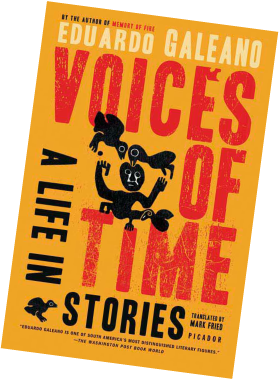 South Americans have it all, really. Beautiful football, beautiful women, amazing parties and, of course, the ability to twist words into soft caresses that whisper agelessly across time zones. In fact, we should all be asking ourselves why we aren't on a plane to Montevideo right now. If you do end up traipsing through the cobbled streets of the Uruguayan capital one day, make sure you read this book before you go.
Voices of Time is different. In fact, it’s not even what you’d call a proper novel. For your usual bibliophile, this book will be a tough challenge. No set plots, no set characters or even a set theme. What you have is 330 vignettes usually delivered over a single page, sometimes even a single paragraph. Galeano talks about all the intricate layers of our existence in short dosages of history intertwined with the poetry of our everyday lives. Starting from blue algae as life began to take shape, he takes us on a voyage through time and through the countless emotions that helped shaped the continents. One moment you are in the hovels of Rio wading past the grime, the next you are in the arena of politics, casually glancing over the casualties of war. There is a singular uniqueness in the idea of the book. The only thing that comes close is Jack Kerouac’s Book of Sketches, but Voices of Time is more than just a compilation of transient thoughts. It’s embedded deeply in history and the vignettes progress quite interestingly.
On to the prose.You’d be hard-pressed to find a writer more adept at turning prose into poetry swimming with potent imagery. Maybe it’s a South American thing, because the lyrical nature of Galeano’s words is not unlike that of Marquez. Indeed, at times Galeano rambles on a lot like the harmless town drunk, nostalgically reliving all his past misadventures, hunched at the bar, long after last call is over. This book is a must read for everyone who enjoys Latin American literature. It’s something that’s affected me deeply on a personal level and I can pay it no higher tribute than the fact that I fully intend to never return it to the friend I borrowed it from.
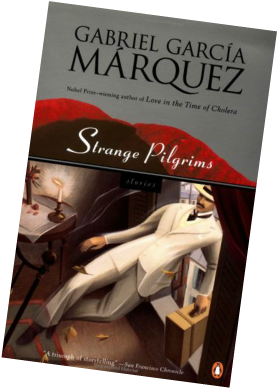 Light is like water,” I answered. “You turn the tap and out it comes.”
One Hundred Years of Solitude is a book every lover of literature should read - a book which portrays the brilliance that is Márquez. Strange Pilgrims is a collection of short stories by the same brilliant writer, comprising stories bordering on fantasy - or magic realism as it is called. Containing twelve short stories, the book explores themes of exile and dislocation and each are in their own way memorable and stays with the reader long after they have been read.
The first story of the book, 'Bon Voyage, Mr. President' is about an overthrown president in exile in Geneva looking for a diagnosis for his chronic pain. The characters grab the attention right from the start and the storyline unfolds while keeping eyes glued to the pages. The first story gets one immersed into the book and it is difficult to not keep on reading till all the stories with their wild, but somehow believable, plots end.
I Only Came to Use the Phone and The Trail of Your Blood in the Snow are two other good stories in the book. Both of these have a very Kafka-esque plot. In the first, a woman gets mistaken for a mental patient as she goes into an asylum to use the telephone and the story deals with her eventual reconciliation with living as a lunatic. In the latter, a wife dies from bleeding from a cut in her finger she received during her wedding ceremony and her husband hopelessly tries to see her, steering past the bureaucracy of the hospitals. Both stories leave the reader feeling a little sad and dejected.
The Saint tells the story of a man trying to prove to the Pope that his dead daughter should be a saint, and his lifelong failed attempts to do so. He travels around Rome with the body of his dead daughter, which after decades has not decayed. The eventual realisation that dawns on the narrator and the reader about the real saint in the story is brilliant.
Light is Like Water is undoubtedly one of the best stories in the collection. It is the most fantastical story of the lot, telling the tale of two young boys who break light bulbs when their parents are away and fill the apartment with light to sail their row boat and go diving. It seems like the vivid imagination of children which ultimately the reader knows is reality.
Other fantastic stories include I Sell My Dreams and Tramontana. While Marquez is not a writer everyone would usually read, the stories in this collection have the elements to get any reader hooked. Anyone looking for good stories, a wonderful narrative and brilliant imagery should definitely give Strange Pilgrims a try. And if the reader has a good imagination, the book becomes all the more magical as they picture drops of blood trailing on the snow, dogs trained to weep at their owner's grave and of sailing ships across oceans of light.
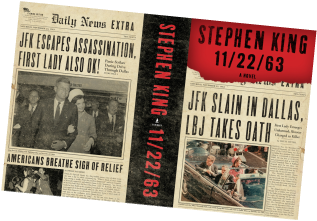 Sometimes, when things are particularly bad, everyone has one of those weak, self-pitying moments when they want to go back and change things; make history run its course in a different path. And that covers the plot of this book somewhat. Except its not petty little life-mistakes that Jake Epping, high school English teacher, is out to change. He is attempting to change the history of the world.
Jake is introduced to a portal to a different time behind Al's Diner by the proprietor of the restaurant himself, Al Templeton. Al is (in)famous for his suspiciously cheap burgers and Jake finds out that Al can manage the low prices because the portal gives him access to September 9, 1958, where he can buy the burger meat at astonishingly low prices.
But Al is dying; quite quickly, in fact. He tells Jake about the mission he had set himself on; a mission to alter American history for the better. He planned to stop the assassination of John F. Kennedy, which took place on November 22, 1963 (11/22/63). But he had to live in the past for five years before he could reach the shooting and by that time he was diagnosed with cancer. So he passes on the mantle to Jake.
But the past is obdurate; it does not wish to change.
King covers the travelling-back-in-time dilemma with his characteristic use of mystery. But that's not the reason you will want to read this book. The real attraction of the book is in the huge amount of research that went into it. King paints a vivid picture of the past and the people he writes about - the historical ones, such as Lee Harvey Oswald [JFK's shooter] and Marina Oswald [his wife] - are real people and you can see their picture online, if you want.
The one thing that might put people off from the book is the fact that it is so very American, which may be hard to relate to. But then again, King has always been a very American writer. And it's not too hard to get used to his writing.
The book has its fair share of gruesomeness and evil, though not nearly as much as some of King's other works. Humans are nostalgic creatures and as Jake goes through his life in the past, moving from place to place, with cheap petrol and friendlier folks, you miss the good old days. Of course, there are certain places which are not very nice. Derry, Maine, for example. Those who have read King's “IT” will be pleasantly delighted by a couple of cameos.
All in all, a decent book. Not one of King's best works. The book is quiet; it draws you in after a few chapters and you will have no idea at which point you really got hooked - a book shaped after its writer. Nostalgic, a little intimidating, sometimes bitter, sometimes sweet; the book just dances through everything. Why not? When it is all said and done, “Dancing is life.”
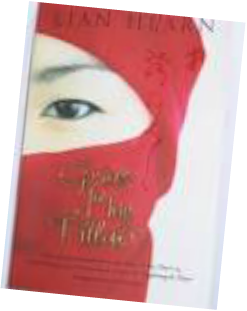 As the second book of a trilogy, Grass for His Pillow is less intriguing than Across the Nightingale Floor. Once the first book takes care of introductions to both story and characters, the second begins building from the exact point where Across the Nightingale Floor left off.
For those who missed the last review, Tales of the Otori tells of Takeo, who is rescued from his village's massacre and adopted by Lord Otori Shigeru into the Otori family. Takeo hones the talents he inherited through his kinship with the mysterious Tribe, as well as fighting skills he learns from Shigeru and other teachers, discovering an entirely different life from what he knew as a child. Shirakawa Kaede, initially a pawn on a political chessboard, and Takeo fall in love, even as she is used to betray Shigeru and the Otori. Grass for His Pillow picks up where Takeo has left Kaede, and this story is told through the eyes of both protagonists. Kaede, returning to her ruined home, climbs the ladder to power as the heir to a family of an ageing father with his young daughters, in a world where women are merely payment for alliances between clans. Meanwhile, Takeo hides from his enemies, and further trains his abilities with those who are familiar with them. He yearns for vengeance for Shigeru, and to claim his right as Shigeru's son and leader of the Otori.
What sets apart this whole series is the use of a mythical Feudal Japan as a backdrop, incorporating a smooth blend of fantasy and history. A minute detail such as a man cutting off another's head without hesitation, yet rescuing moths from a flame with care, emphasises the individual so uniquely that it's admirable. Lian Hearn uses the time in this second book to develop her characters, so all the little details missed out in the fast-paced Across the Nightingale Floor are gradually covered, creating a more believable persona for the lesser characters as well. It's an important feature when a story consists of only a small number of separate personalities.
The politics in the story are well thought-out and executed with precision, so the shifting allegiances are viewed with surprise at every turn. The fights are intriguing, although sometimes it's necessary to scramble to avoid getting lost. For a story which uses fantasy as a baseline genre, it's not as descriptive as it should be, so it can be hard to figure out what exactly just happened. A minor detail, considering the excessively descriptive nature of Lord of the Rings.
Grass for His Pillow is slower than its previous installment as second books are wont to be, but it's hard to lose interest in the tremendous power plays, internal and external, within and between families. It's quite clear that this book is developing the tale, sizing it up for an epic end to the series with the final installment.
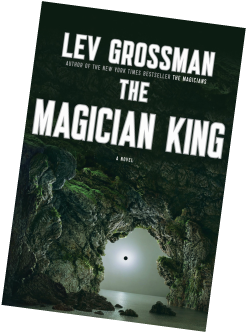 It's not often one comes across a writer who can blend realism into escapism. Lev Grossman is that writer. In the previous review it was mentioned that The Magicians is what would Harry Potter would have been if the characters had actually acted their age and had gone through puberty. This review deals with the ever after part of that story, much like the book.
Grossman leaves us in his first book with a shellshocked Quentin Coldwater who escapes into the magical land of Fillory, after having suffered and paid for all his mistakes. Sounds very traditional, right? Well, the second installment deals with the perils of escape itself. What comes after having conquered evil and horrible foes and having learned great and terrible magics, after becoming kings and queens in a magical land, after living the fairytale to be exact? Well, the answer according to Grossman is nothing.
We find Quentin, bored and frustrated with the life that he is leading. The edges of adventure and danger have faded from Fillory, leaving behind only a decadent luxury that leaves little to the imagination. In a desperate attempt to find a way to inject some thrill back into his life, he embarks on a long voyage to the very edge of the magical world to collect… taxes. This very mundane quest soon turns into the search for a golden key. Grossman's fantasy world, however, doesn't just adhere to the fantasy rules but adds to them. Instead of Quentin finding the key and getting his second happily ever after, he somehow manages to get kicked out of Fillory and gets sent back to Earth.
Once Quentin returns to Earth, we once again diverge from the norms of traditional fantasy writing. In most books, authors generally come up with one way of using magic. Usually it is a clever and unthought-of way, giving the readers a pleasant surprise. Grossman in the first book created a wholly academic style of magic reminiscent of Harry Potter but with people failing and dropping, much like a real school. In this book, Grossman shows us how magic is not just confined to magic schools. There is a vibrant community of street magicians in the world, with their own ranking system and their own way of doing things. And Quentin, educated and cultured, doesn't have any idea how to navigate it. What ensues is Quentin getting more adventure than he bargained for and a side story following Julia (his high school crush) is brilliant and haunting at the same time.
Like in the first book, Grossman explores a world with magic and how people function in it. Instead of wizards living in hidey holes constantly afraid of normal people, in this world we see magicians just trying to keep themselves entertained and occupied. And like most people, magicians are prone to their human failings as well, but nothing quite so romanticised. They have the same insecurities and the same problems that plague us all.
The themes explored here are a lot darker than the first book as well. Self-discovery is well and good, but if something as fundamentally life-changing and character altering as magic is involved, what happens to a person in the pursuit of it? These are questions that aren't generally addressed in other fantasy books. And Grossman seems to like the old adage of innocence lost to a disturbing degree, because instead of enlightenment, most of his characters only bring themselves more grief. And like in the first book, Grossman's conclusion is the same. You don't need fantastical monsters; you just need people being people to destroy the world. Magic just accelerates things.
The Magician King is the second part of this series. And from the way Grossman is going, I can't wait for the third book. Only not quite as breathlessly as he once used to wait for Harry Potter books.
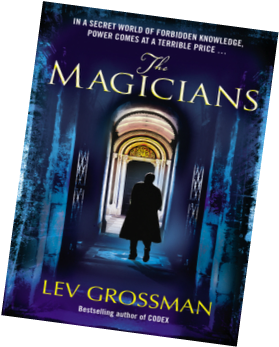 One of the major pains of being a fantasy fan is the long, excruciating wait for a sequel that often does not live up to the hype. While we wait, we often seek a little side-tour without high hopes. Hey, some books are there just to kill time. But then you come across something like The Magicians, and it does a lot more than just kill time.
The Magicians is, on the surface, a mixture of Narnia and Harry Potter, but on a much smaller scale. The story follows Quentin Coldwater, a supersmart teenager living in our world, who fantasises about Fillory, a magical land written about by a writer called Christopher Plover, where several children accidentally travelled, had adventures and became kings and queens. Ring a bell? Only instead of Aslan, Fillory has two Rams as guardians.
So, one day Quentin follows a piece of paper down a garden and ends up in a place where he has apparently been invited to sit for an exam. His mind skips right around the absurdity of it all [which is also a sort of test] and aces the exam. And that's when we learn that he is at a school for magic [called Brakebills] and that he has the option to study it there, should he choose to. That's the Harry Potter association.
Quentin chooses to study at Brakebills [like duh] and eventually majors in Physical Magic, where he is grouped with four other young magicians. They become good friends and eventually, their path leads to a button - a button that takes you to Fillory [overload of Narnia at this point].
So far, it sounds like it's a glorified fan-fiction, and by God, it's hard to defend it from that accusation. But look at it like this: the book takes elements from Harry Potter and Narnia, but it transforms into something else. This is not a book for kids, though HP was dark when it wanted to be. There are more complex emotions that storm around the book. Things are not simple and straightforward and magic is not easy. It takes really brilliant people a lot of work to master simple things. For another, we are not going at it year by year with a neat little problem at the end.
The book is unflinchingly bittersweet. In many ways, it is the next step for the HP generation. You have learned magic, but there's nothing much to do. There's a sense of pointlessness, a frustration that addresses the core of our nature that hungers for fairy tales and fantasies, that looks for escapes in another world.
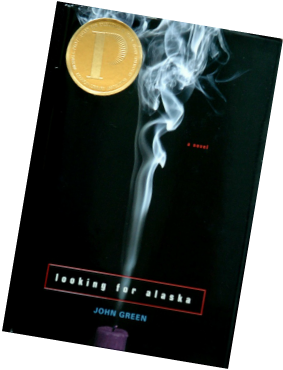 A slow-to-the punch, yet extremely gripping debut novel by John Green, Looking for Alaska, is one of those books which continue to affect us long after we have put it down. Separated into two parts - “BEFORE” and “AFTER” - with a twist in the middle, this novel asks and answers some tough, controversial questions.
Before: An unsocial sixteen-year-old, Miles Halter (Pudge) has a strange fascination with the last words of great men. Author François Rabelais' enigmatic last words “I go to seek a Great Perhaps” inspire the sixteen year-old to leave his safe life at home and enroll in Culver Creek, a co-ed boarding school in Alabama. Pudge is the stereotypical odd kid: chicken-leg skinny, undeniably bright, and a bit of an idealist at heart.
He is quickly befriended by a strange group of people - his roommate Chip, romantic Romanian girl Lara, with her strange habit of mispronouncing words with “I” and Takumi, a clever, humorous Japanese boy. They introduce her to Alaska, the beautiful girl who “had eyes that predisposed you to supporting her every endeavor.”
Alaska's carefree nature, everlasting smile and sly ways entice Pudge. He delves into a world he never imagined before - running away from classes, sneaking to the lake to grab cigarettes, pulling pranks constantly. Alaska is the embodiment of all things self-destructive and screwed up, but also the epitome of utmost beauty and by always living on the edge she launches Pudge into his long-awaited “Great Perhaps” and steals his heart in the meantime.
After: The purpose behind the slow, rambling and somewhat clichéd “before” section is revealed, as the course of the story is completely shifted and the deeper meanings are addressed. This thought-provoking, and spellbinding last section really makes every bit of this novel extraordinary. The characters spend their days trying to figure out the mystery which overshadowed their lives, and answer questions about the true meaning behind life.
It's surprising to critics that such an engaging, mature, and complex novel was directed towards high-school students, but Green's purpose was to help teenagers grow by introducing them to serious topics in an engaging way. “Looking for Alaska” is a book exploring religion and its applications to our own lives and thoughts. The book centers on Miles's lessons with Dr Hyde, a World Religion teacher who opens Miles's mind to consider the world through the ideals of religion and philosophy. He teaches him to be aware of the present, and listen and talk, rather than over-think the future.
Green was awarded the 2006 Michael L. Printz Award (for excellence in young adult literature) for “Looking for Alaska”, which is deserved by this gorgeously written, passionate and hilarious novel. The stories of these vividly beautifully portrayed characters - bad kids at times and touching at others - help readers deal with self discovery. The audience will be grinning, laughing and crying throughout the book but mainly they will fall in love with Alaska's vanilla-and-cigarettes scent and optimistic ways, and stay enticed till the very last page.
This book delivers a haunting narrative about teenage-hood and the mistakes and successes associated with it. It depicts love in all its many forms, and explores deeper themes such as where our ‘Great Perhaps’ lies. Looking for Alaska is a heart-wrenching, moving story that deserves a place at the top of your reading list
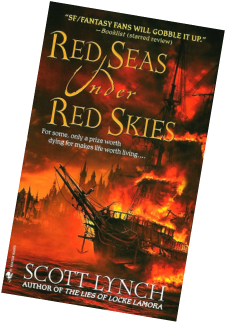 Certain authors manage to incite in the reader a level of enthusiasm that can be almost called zealotry. Look at what L Ron Hubbard achieved with his work. Not to say that Lynch will go on to create a cult of his own called Monkeyshineology. But Lynch does write better, if not just as well, as Hubbard ever did.
The events of the first book left the reader in somewhat of a lurch. While appreciative of Locke Lamora and Jean Tannen's sheer audacity in the face of the odds against them, one does feel saddened by the departure from Camorr. There is this feeling of unfinished business left behind in the city. The second book ostensibly takes place in Camorr's rival city state, Tal Verrar.
Lynch's talent in world building shows through again with this new city, which is markedly different from the claustrophobic, Venice-like Camorr. He manages to instill enough ambience and character to make the city seem like a place we know, or at least once knew. There are familiar truths mixed in with the fantastical descriptions that make everything you imagine feel on this side of real.
In this installment of the Gentlemen Bastards, the reader is shown how Locke Lamora and Jean Tannen have made for themselves a nice little niche in the gambling houses of Tal Verrar, conning honest and dishonest gamblers. Their ultimate goal is of course to land themselves a big fortune, by cheating someone else out of theirs. Like always, the complete lack of anything resembling a conscience in the face of
their own benefit makes these characters all the more interesting. Especially when considering the slew of honest and noble characters that one finds in every other fantasy series.
Unlike the first book, where Lynch focused primarily on creating a world full of organized crime, territorial in their activities all bowing down to an overarching overlord; this book focuses on a more disparate element of the criminal world. Pirates. Through a sequence of events that sometimes prove to be both hilarious and devious, the Gentlemen Bastards end up on a pirate ship. And learn to be pirates. And then become pirates. The one area of stealing that they hadn't taken part in before during their rather rigorous training.
The story is somewhat less complicated than the last one, mostly because Lynch seems to have learned from his mistakes. Instead of haphazardly shifting between the past and the present, which he still does, he has learned how to pace each segment so that the book doesn't feel hacked together. There are more villains that Locke and Jean have to deal with and the villains themselves are refreshingly different and colorful in their own rights and the readers learn to hate them so. Added to this is the fact that the Bastards haven't really managed to escape their past, or the fact that deep down, they are still Camorri. They need revenge for every slight ever dealt to them.
Fantasy books are renowned for their size and heft. Lynch doesn't seem to need three hundred thousand words to tell a huge story. He has a sense of brevity, managing to tell a far longer story than one would have anticipated. And he leaves the reader once again with the feeling that there was so much more the characters could have done in Tal Verrar.
Read this book. If only because we need to one day create Monkeyshineology. Tom Cruise would donate his eyes to monkeyshine.
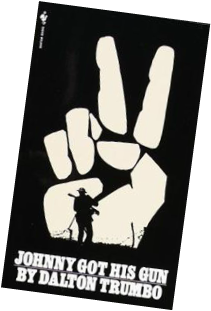 You may be the most imaginative person in the world and yet it would be difficult for you to place yourself in Joe Bonham's shoes. What is life like when you have no limbs, can't see, hear or communicate in any way - half your face blown away and you are not even sure if you are, at any particular moment, dreaming or not. Dubbed the Most Original Book of 1939, Johnny Got His Gun follows the story of a young soldier drafted to fight the First World War and his life as a permanent patient in a hospital where he is lying after being hit by an artillery shell.
The book consists of basically what Joe is thinking - so there's no outside perspective of what is actually happening. The highlight of the book is his realisation and his attempts at accepting his situation.
The book has a very pacifist voice, and was even used as a point to stop involvement in wars. It describes Joe's childhood, his parents, the time he went fishing, his short adolescent love life and in the middle of one these jumbles memories he realises he has no arms. They must have had to chop it off. And when he feels top heavy and sinking, he eventually realises he has no legs either. No face, breathing through a tube. And he wonders in astonishment at being still alive - people leave hospitals without arms, legs, sometimes faces gets blown off - but they live. But how could all the worst possibilities happen to him all at once - and he realises that one miniscule probability exists to whom the worst possible can happen.
He tries to keep himself busy, to get a grasp of time, to count the days, weeks and years which pass by with him as a vegetable. With nothing to do but think, he comes to the conclusion that life is too precious to waste fighting someone else's war to the point he gets aggressive in his mind about the benefit of democracy to the man dead or incapacitated like him.
His attempts of communicating succeed one day, thanks to a nurse. Using Morse code which he used as a kid to talk to a childhood friend on rainy days, he finally gets through. He begs the doctors to kill him and after a while he understand that he would rather live, even if as a circus freak enclosed in a glass case to be shown to the world as the horrors of war.
The book is extremely touching, to the point that in one scene Joe drifts between dream and reality and imagines a rat biting away at his side while he can't do anything about it, can't shake it off, can't cry for help, you imagine his plight and just want to get through the part and know that he is alright.
Dalton Trumbo writes in a very uncharacteristic way for his time, a little reminiscent of Hemingway. Short sentences, no punctuation, drifting between reality and dream, sudden shifts of memories - all of these make the book all the more wonderful. It's a very fast read and gets the point across about war. The book is a classic and though not many know of it, the story should be familiar to all fans of Metallica. Their song 'One', was written based on the book, and the music video uses actual footage from the movie. And for someone who likes the song, the book will induce a few smiles as you find the lines taken verbatim. And in case you are wondering, the title of the book is a play on “Johnny get your gun” - a sentence which was used to encourage the young men to join the army.
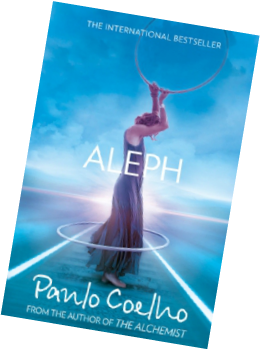
'ALEPH' takes the readers on a journey spanning the 9288 km of the Trans-Siberian railway and guides them on a trip through space and time. The story is about Paulo, a renowned writer, who embarks on this journey in search of his spiritual peace.
The story starts with Paulo confessing to his mentor, J, his disappointments with life and the Tradition, which he learned for years. On his advice, Paulo starts travelling through the continents of Africa, Europe and Asia, signing books, meeting readers and slowly conquering his kingdom.
Filled with euphoria, he commits to a train-ride through Russia. He meets Hilal, a beautiful young woman and violin virtuoso, during his sojourn in Moscow. She claims that they were destined to meet and that she had the answers to all of Paulo's questions. Soon he realises that Hilal was the key to his spiritual expedition.
Despite the constant disapprovals of his editor and publisher, he lets Hilal tag along. He discovers that they were entangled in a spiritual web of love 500 years back, when they entered the Aleph, a parallel dimension where there is no past or future but all is present. Over the course of the journey, the story of their past unravels; he unlocks the secrets with the help of Hilal, and discovers that he betrayed her in their past lives.
The tension increases near the end where the two protagonists find themselves in love with each other in their current lives. But their romantic desires need to be broken in order to carry on with their separate lives.
Throughout the story, Paulo talks about spiritual concepts including incarnations. A person will somehow relive the incidents that happened in his past lives, till nirvana is reached.
Aleph is a story of love, forgiveness and spiritual enlightenment. It is the most personal book of his till date. If you haven't read Paulo Coelho's books before 'The Alchemist; would be a good start. His books speak to those who take life as the train and not the station. These tell the stories of Paulo himself, of the characters and of us.
|










 RSS Feed
RSS Feed